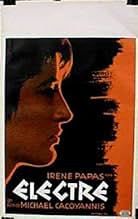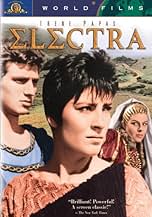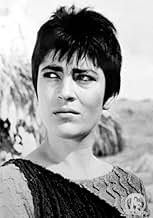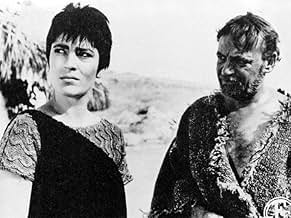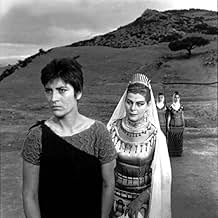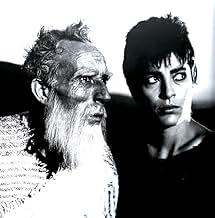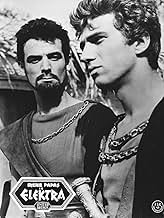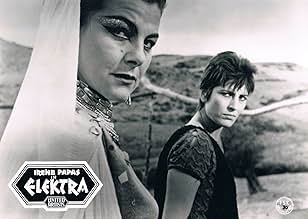CALIFICACIÓN DE IMDb
7.6/10
2 k
TU CALIFICACIÓN
Los hijos exiliados de un rey asesinado y destronado se reúnen para buscar venganza contra los responsables.Los hijos exiliados de un rey asesinado y destronado se reúnen para buscar venganza contra los responsables.Los hijos exiliados de un rey asesinado y destronado se reúnen para buscar venganza contra los responsables.
- Dirección
- Guionistas
- Elenco
- Nominado a 1 premio Óscar
- 11 premios ganados y 2 nominaciones en total
Fivos Razi
- Aegisthus
- (as Phoebus Rhazis)
- Dirección
- Guionistas
- Todo el elenco y el equipo
- Producción, taquilla y más en IMDbPro
Opiniones destacadas
Euripides is the most 'modern' of the ancient dramatists in terms of his psychological penetration and the motives of his characters. This makes his plays ideally suited to the medium of film. Michael Cacoyannis set about the task of filming an Euripidean trilogy of 'Electra', 'The Trojan Women' and 'Iphigenia' of which 'Electra' is arguably the best. The score of Theodorakis, cinematography of Walter Lassally and a fabulous cast headed by Irene Papas as Electra, Yannis Fertis as Orestes, Aleka Katselli as Clytemnestra and Manos Katrakis as the Tutor all contribute to a stunning and mesmerising filmic experience. Cacoyannis, Lassally and Papas would go on to make 'Zorba the Greek' and Papas would play Helen and Clytemnestra for the same director.
Euripides wrote 'Electra' in about 420 bc and like those other masterpieces of the human mind 'Hamlet' and 'Phaedra', it is for all the ages. Let us be grateful to Cacoyannis for having given us this splendid version. Top marks.
Euripides wrote 'Electra' in about 420 bc and like those other masterpieces of the human mind 'Hamlet' and 'Phaedra', it is for all the ages. Let us be grateful to Cacoyannis for having given us this splendid version. Top marks.
Euripides pared to the essentials. Not one word, not one gesture is wasted. Nor is there ever an iota more than necessary.
A stark, spare study of despair in a sun blasted landscape that seems to watch over the pathetic efforts of humans with equal measures of timeless indifference and utter contempt. The characters in the story, the actors on the screen, and we in audience know what will happen next; but we are all powerless to prevent it. It is so intense that it makes Shakespeare's 'King Lear' seem almost frivolous.
It takes five minutes for the first two words to be spoken. 'Strike him!' Everything flows from that line. Another ten minutes of near silence passes before Electra appears. Her back to the camera, she turns to look over her shoulder - electricity is discharged. The audience gasps. Nothing is said but the implacable will is communicated. Nothing good is going to happen next.
It is almost a silent movie. They certainly have faces, to quote Gloria Graham from 'Sunset Boulevard.' By looks, by camera angles, by gestures, by the tensing of shoulders, the widening of eyes, make-up, fine photography, tight cutting, and very few words the tragedy unfolds.
It is always about Electra, to be sure, and Irene Pappas is a force of nature on the screen. She says little but each move, gesture, look, and word is supercharged.
Recommended for adults.
A stark, spare study of despair in a sun blasted landscape that seems to watch over the pathetic efforts of humans with equal measures of timeless indifference and utter contempt. The characters in the story, the actors on the screen, and we in audience know what will happen next; but we are all powerless to prevent it. It is so intense that it makes Shakespeare's 'King Lear' seem almost frivolous.
It takes five minutes for the first two words to be spoken. 'Strike him!' Everything flows from that line. Another ten minutes of near silence passes before Electra appears. Her back to the camera, she turns to look over her shoulder - electricity is discharged. The audience gasps. Nothing is said but the implacable will is communicated. Nothing good is going to happen next.
It is almost a silent movie. They certainly have faces, to quote Gloria Graham from 'Sunset Boulevard.' By looks, by camera angles, by gestures, by the tensing of shoulders, the widening of eyes, make-up, fine photography, tight cutting, and very few words the tragedy unfolds.
It is always about Electra, to be sure, and Irene Pappas is a force of nature on the screen. She says little but each move, gesture, look, and word is supercharged.
Recommended for adults.
From the first moment I saw the movie I rejoiced every bit of it : the crisp splendid black-and-white photography introducing an overwhelmingly barren landscape interacting with the drama we all know to come, the haunting "ancestral" score by Theodorakis, the impact of all sounds, the use of the choir with its laments and warnings and commentaries on everything and everybody, the tensions between good and evil mixed with love and hate, the unavoidable fate of the protagonists who cannot escape destiny as prescribed by bloodline and gods.
Besides being moved by too many unforgettable scenes enforced by splendid suggestive cutting (the actual murders, Electra's cutting her hair for the revenge to come, the confrontations between mother and daughter or brother and sister expressing their antagonistic emotions), the ultimate brilliance this masterpiece is Irene Papas outcry of grief and distress, the camera turning on itself as taking literally heaven and earth as her witness.
Appealing as strong to me as E. Munch's cry or Picasso's Guernica, I visited Mycene much later and still felt the movie's impact discovering this cursed place through Cacoyannis' lens.
Besides being moved by too many unforgettable scenes enforced by splendid suggestive cutting (the actual murders, Electra's cutting her hair for the revenge to come, the confrontations between mother and daughter or brother and sister expressing their antagonistic emotions), the ultimate brilliance this masterpiece is Irene Papas outcry of grief and distress, the camera turning on itself as taking literally heaven and earth as her witness.
Appealing as strong to me as E. Munch's cry or Picasso's Guernica, I visited Mycene much later and still felt the movie's impact discovering this cursed place through Cacoyannis' lens.
As an adaptation of a two thousand year old Greek tragedy, Michael Cacoyannis' "Electra" is hard to beat, and I cannot imagine it being improved upon by any further attempt on it now: there is a stripped down starkness and simplicity to it that benefits it greatly, and lends it the haunting quality of myth that no amount of CGI could better.
It has immaculately brooding, glowing cinematography, unsurpassably shot amid the ancient stones of Mycenae itself, and the music by Mikis Theodorakis (of Zorba The Greek fame) is timeless and perfect.
If I had to point out any weaknesses at all, perhaps Irene Papas in the title role looks a little too 60s in her look, although her acting is fine. There's a couple of gaps in the narrative that should probably have been filmed and inserted, as their absence either weakens the drama or feels confusing. But these are small quibbles.
Several times while watching I found myself thinking it would make a good double bill with Orson Welles' Othello, as it feels cut from a similar cloth, though it is a better film for being less wordy. Recommended.
It has immaculately brooding, glowing cinematography, unsurpassably shot amid the ancient stones of Mycenae itself, and the music by Mikis Theodorakis (of Zorba The Greek fame) is timeless and perfect.
If I had to point out any weaknesses at all, perhaps Irene Papas in the title role looks a little too 60s in her look, although her acting is fine. There's a couple of gaps in the narrative that should probably have been filmed and inserted, as their absence either weakens the drama or feels confusing. But these are small quibbles.
Several times while watching I found myself thinking it would make a good double bill with Orson Welles' Othello, as it feels cut from a similar cloth, though it is a better film for being less wordy. Recommended.
An extraordinary film from a visual and dramatic standpoint, _Elektra_ unfortunately too often plays like a _Cliff's Notes_ version of Euripedes' work (although, in all fairness, I must note that the film is only "based on" the classical play). The essential structure is there: Agamemnon's murder, the banishment of Orestes, Elektra's marriage, the reuniting of the grown children, the double murder. But by clipping away much of the Euripedean dialogue, much depth of characterization is lost. The principles become one-dimensional, with only hints of the complexity which makes the story so overwhelming. However, the stark cinematography and fine acting make this film eminently watchable, particularly at the climatic matricide sequence.
¿Sabías que…?
- TriviaFilmed on location in Mycenae and Argos in 1961.
- ErroresHaving seconds thought about killing Klytaemnistra, Orestis proclaims a devil, not a god, must have spoken to the oracle who told him to seek vengeance. As it happens, the word "devil" comes from the Greek word diábolos which means slanderer or accuser, not the Christian or Islamic word for a supernatural enemy of humankind tempting people to commit evil deeds.
- Citas
Chorus Leader: My child, you must talk to the gods. They will hear you.
Elektra: No god hears me. No human being is listening to my prayers.
- ConexionesFeatured in Storgi sto lao (2013)
Selecciones populares
Inicia sesión para calificar y agrega a la lista de videos para obtener recomendaciones personalizadas
- How long is Electra?Con tecnología de Alexa
Detalles
- Tiempo de ejecución
- 1h 50min(110 min)
- Color
- Mezcla de sonido
Contribuir a esta página
Sugiere una edición o agrega el contenido que falta

